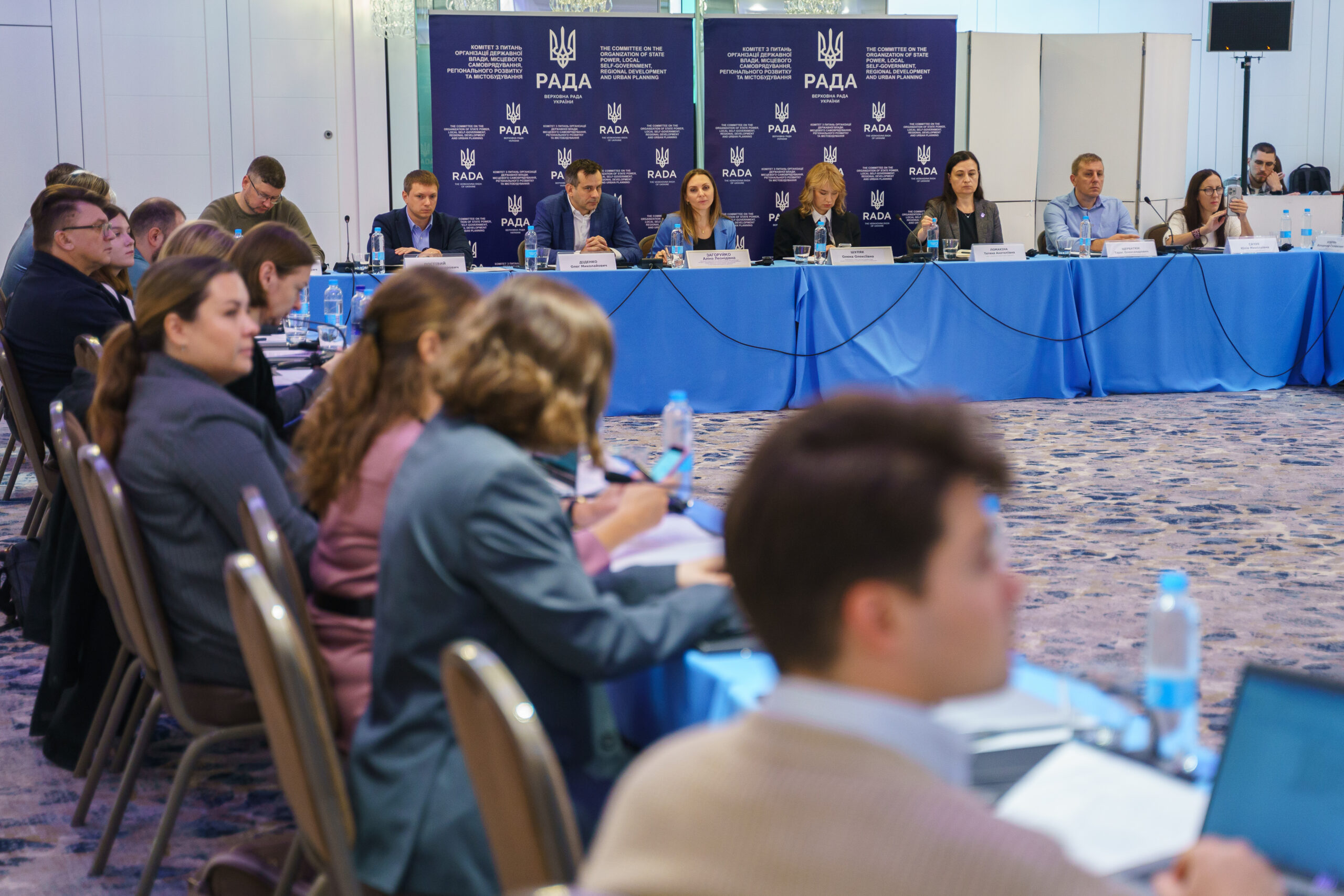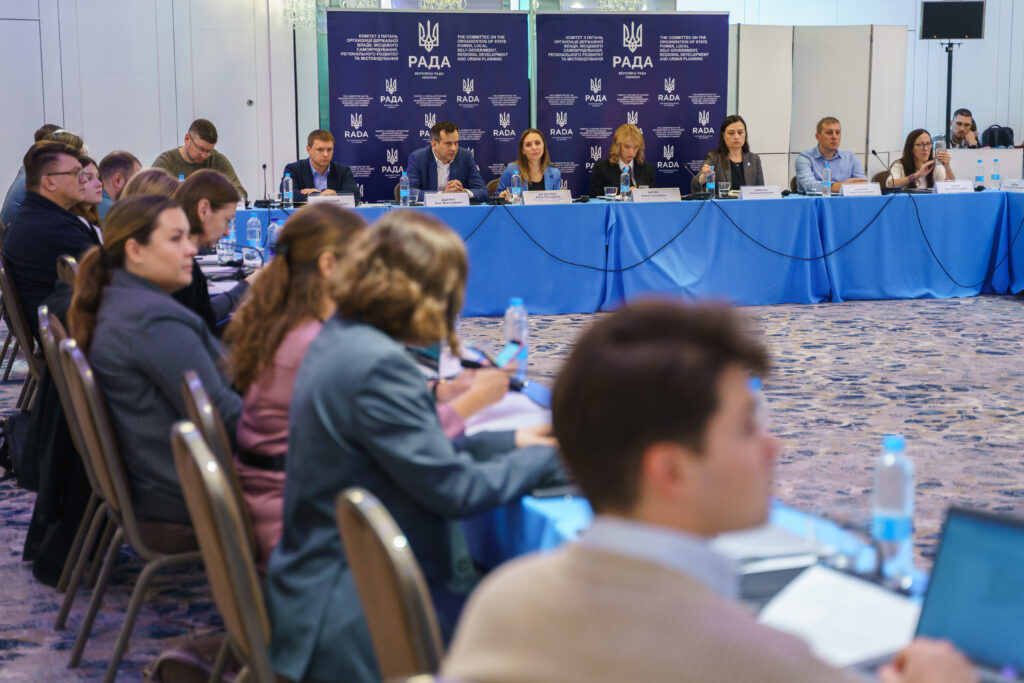

(Original article published by Civil Network OPORA)
The Electoral Code adopted in 2019 guarantees the accessibility of the election process for people with disabilities and low-mobility citizens. However, polling stations in Ukraine still remain non-inclusive, while the number of people with disabilities is growing due to Russian aggression against Ukraine, with infrastructure being destroyed.
These aspects were discussed by the participants of the round table “Ensuring the inclusiveness and accessibility of the election process in the context of post-war challenges. Status quo of electoral infrastructure after the war and search for solutions”, which took place on October 7.
As the Head of the VRU Committee on the Organization of State Power, Local Self-Government, Regional Development and Urban Planning, Olena Shuliak, said, it does not matter when the first post-war elections take place — they must be free, fair and meet democratic standards.
“Before the full-scale invasion, there were more than 1.3 million people with disabilities in Ukraine. Unfortunately, the Big War causes surges in these numbers. In addition, Russia is physically destroying our electoral infrastructure. While in the 2019 elections, every sixth polling station was not adequately equipped to ensure barrier-free and accessible conditions, and more than 3,000 polling stations were not equipped with ramps, in the next post-war elections, according to various estimates, we might have up to 40% of the low-mobility population,” she said.
Olena Shuliak also emphasized that the issue remains unresolved of how to ensure the right to be elected for the military, as well as for women and young people who have left abroad.
An MP and Head of the Subcommittee on Elections, Referendums and Other Forms of Direct Democracy, Alina Zahoruiko, said that the first steps to ensure the accessibility and inclusion of the electoral process were taken during the adoption of the Electoral Code in 2019.
“We have a recommendation of the OSCE/ODIHR mission on the results of observation of the regular local elections in 2020, which reads as follows: “We should take additional measures to further ensure autonomous access and participation in voting for voters with disabilities. At the same time, if possible, one should adhere to the principles of universal design and reasonable organization of space,” she said.
Head of the Central Election Commission, Oleh Didenko, said that the topic of accessibility in general and the election process in particular was not given enough time, but now the situation is changing.
“Inclusion has become a cross-cutting theme of the Strategic Plan of the Central Election Commission. Back in 2020, the Commission established a Working Group on Ensuring, Implementing, and Protecting the Voting Rights of Persons with Disabilities, which is still functioning. We tried to involve representatives of other public authorities, NGOs, international partners, as well as people with disabilities to work in the group,” he said.
Olha Kotsiuruba, Senior Legal Adviser of the Civil Network OPORA, emphasized that the Central Election Commission has done its utmost at the level of by-laws — they incorporated requirements for the accessibility of polling stations and information posters.
“This month, we have conducted a thematic sociological survey. 41% of respondents believe that people with disabilities will be the social group to face obstacles in voting. This is a high percentage compared to other social groups, but we all have to apply our effort to understand the barriers, how to remove them at the legislative level and how to make them the focus of attention of an even larger part of society. This is the post-war challenge because the number of people with limited mobility is growing,” she said.
Tetiana Herasymova, director of the human rights organization Fight for Right, says that according to the findings of a survey on the political participation of the population (200 people with disabilities and 200 people without disabilities), 61% of people with disabilities and 69% of persons without disabilities participated in the last local elections. This shows that the potential of people with disabilities for effective political and civic participation is on par with the potential of people without disabilities. Among the important steps to enhance the political participation of people with disabilities, she mentioned the debunking of stereotypes about such people and their inclusion in decision-making processes, amendments to legislation to increase accessibility, and harmonization of Ukrainian legislation with EU acquis.
The expert on the rights of people with disabilities, Fight for Right, Yulia Sachuk, added that the Law on Media requires minimum standards of harmonization with the EU Audiovisual Media Services Directive (AVMSD). Article 7 contains requirements for media accessibility, in particular, the use of sign language, subtitles, voiced subtitles, and audio recordings.
Deputy Chair of the Board of the “Active Rehabilitation Group” NGO, Uliana Pcholkina, said that accessibility and barrier-free should be widely thought about so that everyone can participate in electoral processes, not only as a voter but also as a representative of political parties.
“For more than 19 years, I have been living with a disability as a result of an injury and using a wheelchair. During this time, I have had various experiences of voting and running as a candidate, which allowed me to see many problems that still need to be addressed. The ramp alone at the polling station does not solve the issue of accessing it for a wheelchair user. Very often, smart devices they are trying to introduce hastily and shortly before the elections do not work,” she said. According to her, whereas a short visit to a polling station in a wheelchair in order to vote is possible, at least at some polling stations, a long stay of a person with a disability on the premises of the polling station, such as in the role of a commission member, an observer, or a candidate, is impossible. The reasons are, among other things, the lack of accessible bathrooms and sufficient space in the station.
She also underscored that security issues are of paramount importance if the elections are held before the complete end of Russian aggression. After all, today, people with disabilities do not have the opportunity to protect themselves from shelling by going down to the shelter — because of the inaccessibility of bomb shelters.
MP Iryna Herashchenko said that ensuring inclusion in the electoral process is one of Ukraine’s obligations for accession to the European Union. However, at the moment, Ukraine is not ready for European standards for people with disabilities.
“Very little attention is paid to this problem, although, in my opinion, the issue of accessibility of Ukrainian infrastructure would be supported by our partners if there was a more systematic work. It is important to build ramps not just for the checklist but also to make sure they meet the standards, have the appropriate width for the trolley, and the appropriate slope,” she said.
Head of the “Cherkasy Human Rights Center” NGO, Taras Shcherbatiuk, presented the results of the monitoring of the accessibility of polling stations conducted by OPORA’s election ombudsmen in 2020.
According to him, in July-August 2020, it was found that out of 500 polling stations, only 15 (3%) are accessible to people with limited mobility.
In 2024, local governments and executive authorities also provided information on the accessibility of polling stations. Unfortunately, the situation has hardly changed in the past four years.
“If we look at these data, it is impossible to hold elections now. Because most people with disabilities will not be able to join this voting. As to the impact of the war: in Zhytomyr oblast, the Korosten district military administration reported that some polling stations were destroyed, so they were not covered. In Donetsk oblast, from the case of Sviatohirsk hromada, we can see that all polling stations were ruined or destroyed. Luhansk Oblast Military Administration reported that access to polling stations was completely lost,” Shcherbatiuk said.
He added that it is necessary to change the mechanisms related to the implementation of the National Strategy, in particular at the local level, so that local governments become involved in this process.
Volodymyr Kobryn, Legal Advisor of the Civil Network OPORA, presented a study on the risks in the implementation of political participation of voters with disabilities in the post-war period.
“During the post-war election process, there will be questions about barriers at polling stations (ramps, doors, queues, separate voting booths, high tables in booths inaccessible to people on wheelchairs, poor lighting, inaccessible information posters, etc.). Analysis of complaints received by the Verkhovna Rada Commissioner for Human Rights during martial law and the results of monitoring activities show that people with disabilities experience prejudice and discrimination and remain socially invisible,” OPORA’s lawyer said.
Member of the Central Election Commission, Serhii Postivyi, talked about the project “Voting Without Barriers”, which the CEC is currently working on. This project aims to ensure that each voter can vote independently at the polling station without the help of third parties. The project provides for the introduction of common reasonable applications that contribute to the reduction of barriers for all groups of the population and are provided in all polling stations and election commissions (for example, magnifying glass, thickeners on the handle, a pen with a stand, additional lighting), as well as highly specialized means for individual needs (mobile applications for people with speech impairments, online sign language interpreters, tactile overlay in Braille).
“Even something as simple as a pen with a stand. What’s so unique about it? One of the servicemen who has prostheses of both hands says that it is critical for him because when the pen is in a horizontal position, it is difficult for a person with a prosthesis to take it and mark the ballot,” Postivyi said.
He also added that the Central Election Commission plans to publicly test all the proposed reasonable applications in order to improve the accessibility of polling stations and guarantee the voting rights of people with limited mobility.
Subscribe to our
newsletter
Sign up for our monthly newsletter
and receive the latest EPDE news
Sign up for our monthly newsletter and receive the latest EPDE news
Subscribe to our
newsletter
Sign up for our monthly newsletter
and receive the latest EPDE news
Subscribe to our
newsletter
Sign up for our monthly newsletter and receive the latest EPDE news